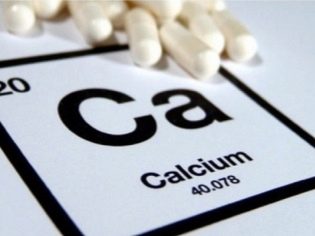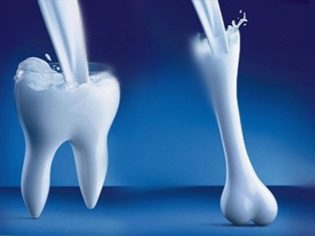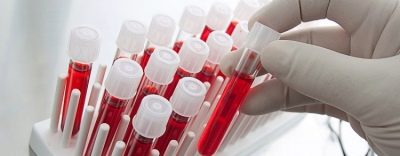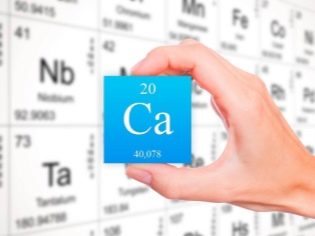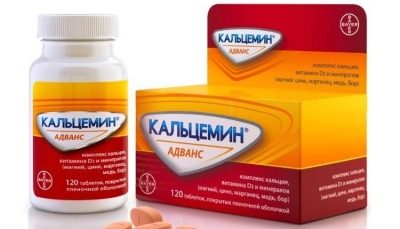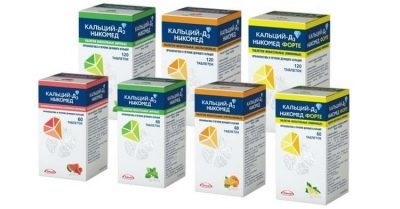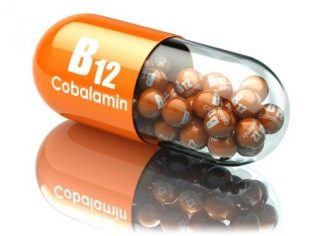What is the best calcium supplement to choose during pregnancy?
The correct balance of vitamins and minerals in the body of a pregnant woman is the key to the successful formation and development of the baby. Even a minor lack of magnesium or iron can lead to serious consequences.
The role of calcium is difficult to overestimate, because it is - one of the main "building materials" for the baby and the guarantor of the normal flow of the gestation period for his mother.
What calcium preparations can be taken during pregnancy, and in what cases they are shown, we will explain in this article.
About the need for a mineral
Calcium takes an active part in almost all metabolic processes in the human body. It is especially indispensable for a pregnant woman, because the baby growing under her heart draws supplies of nutrients from maternal blood.
Calcium is necessary for the baby as an important component for the formation of bones, cartilage tissue, teeth and nails. Calcium deficiency in the mother’s blood can adversely affect the crumbs.
In most cases, with hypocalcemia (calcium deficiency), the child tries to take the most out of the amount of mineral that the mother has, as a result, the woman begins to break her teeth, nails, hair, there may be more serious consequences.
Calcium is involved in the process of blood formation as a regulator. It affects such an important ability of blood as clotting.
If calcium is not enough, then clotting is broken, which is fraught with serious blood loss and massive bleeding during childbirth. Lack of mineral is dangerous for women and the likelihood of osteoporosis, and for babies - the risk of congenital rickets.
The speed of nerve impulses depends on the amount of calcium in the body. If this substance is not enough, then the woman starts having problems with heart activity, tachycardia often develops, and convulsions can occur. Babies in such women are born with excessive nervous irritability..
The ability of calcium to affect the contractility of the muscles in case of its deficiency can lead to a violation of the mechanism of the cough reflex, problems with intestinal motility. Often the result is preeclampsia - low blood pressure and swelling. Calcium deficiency significantly increases the likelihood of preterm labor.
Symptoms of hypocalcemia
Calcium is usually found in vitamins and vitamin complexes that almost all women take during pregnancy. However, sometimes it may be necessary to take additional calcium supplements.
Guessing that this essential mineral in the body is not enough, a woman can for a number of symptoms characteristic of hypocalcemia:
- There are cramps, "Twitching" in the muscles, sometimes reduces those or other muscles, most often calf.
- The gums from time to time bleed.and in the case of a small cut or even a scratch it is very difficult to stop the bleeding.
- Future mother's pulse is very unstable - he then quickens, it becomes rare.
- Skin has become dry and vulnerable, and the hair began to fall out.
- Tooth enamel softens, which leads to mechanical injury to the teeth.
- The woman often changes mood, there is a tendency to hysterics, psychosis, prolonged depression.
The most susceptible to hypocalcemia are women who do not have the opportunity to fully eat and take vitamins, women who are fragile in body build. The risk of calcium deficiency is increased in those who have already given birth three times or more, especially if the time difference between the genera is not so great.
Future moms, who themselves suffered from rickets as a child, may also have problems, as well as pregnant women with chronic kidney, liver or intestinal ailments.
It is noteworthy that natural blondes with light skin and bright iris of the eye suffer from hypocalcemia more often than others.
An increased risk of calcium deficiency is also observed in pregnant women who cannot give up the bad habit of smoking, as well as in women who have a sedentary lifestyle.
A child born of a pregnancy accompanied by hypocalcemia, often suffer from growth retardation, it may have abnormalities in the formation of teeth, bone tissue, increased nervous irritability.
At a very early age, children suffer from tremor of the limbs and chin, a tendency to the occurrence of seizures of various types. The most dangerous consequence is the divergence of the seams of the bones of the skull.
Diagnostics
Even if the expectant mother found one or more of the symptoms described above, you should not immediately run to the pharmacy for calcium preparations. After all, only laboratory diagnosis can confirm hypocalcemia, in particular, blood chemistry. Therefore, it is better not to go to the pharmacy, but to your physician, and ask him for directions on biochemistry.
A small amount of venous blood is required for analysis. Take it on an empty stomach, for two days eliminating from the diet fatty, spicy and too salty foods.
If any medications are taken and there is no possibility to interrupt their admission for several days, it is necessary to inform the medical staff and the blood sampling provider.
If the calcium deficiency is established laboratory, the doctor will certainly advise the pregnant woman about what calcium preparations she should start taking in order to fill this deficiency and avoid negative consequences for her own health and well-being.
Dosage and Needs
Calcium for pregnant women is required in an increased dose compared with the requirements for this mineral for non-pregnant women. Future mother needs 1500 mg of calcium per day.
The peculiarity of the human body is such that more than 500 mg of this substance cannot be absorbed at one time, and therefore the daily dose of 1500 mg should be divided into three doses.
Exceeding the dosage is not worth it, nor is it necessary to drink calcium supplements for prophylactic purposes, because overdosing with this mineral is also dangerous, it especially “hits” the condition of the kidneys and urinary system of a pregnant woman. Also you should not make a decision about taking calcium supplements yourself, without prior diagnosis and consultation with a doctor.
In the first trimester of pregnancy, the baby takes no more than 2-3 mg of calcium from the mother per day, this amount at the stage of the formation of internal organs is sufficient.
Active growth of bones and cartilage begins in the second trimester. The need for mineral increases hundreds of times. For a period of 30-36 weeks, the baby's need for this substance is already 250-300 mg per day..
The treatment regimen for identified hypocalcemia in expectant mothers always includes diet correction. Products that contain a large amount of this mineral - cottage cheese, milk, chicken eggs, fresh greens, sea fish, cheese and nuts are introduced into the pregnant menu.
Depending on the quantitative assessment of the deficiency, which biochemical blood tests show, drugs can also be recommended, the main active ingredient of which is calcium.
List of approved drugs
Pure calcium tablets or solutions do not exist. It is always combined with other substances that allow the basic mineral not only to preserve, but also to strengthen its properties. Therefore, in most cases, the names of the drugs contain the names of two substances at once.
Calcium preparations in the overwhelming majority are not prohibited during pregnancy, but only the doctor can choose the best for a specific woman, who knows exactly how severe the mineral deficit is.
We have compiled a list of the most popular drugs prescribed to pregnant women with hypocalcemia.
Calcium-Active
This is a Russian drug whose composition is unique in its own way - in addition to calcium, it contains a substance that regulates calcium metabolism - complexone. Calcium itself in this tool is organic, it is well absorbed by the body. Such calcium is of natural origin - pharmacists extract it from amaranth leaves. This plant is considered a record holder for the ability to accumulate this mineral.
The dosage is determined by the doctor, but the woman should know that one tablet contains 50 mg of calcium and vitamin D3.
Take the drug should be before meals, pre-chewing. Calcium Activ medicine is not considered a dietary supplement.
Contraindications virtually no. The exception is individual intolerance to the components, but it is rare. Side effects, if you believe the instructions for use, no.
"Calcemin"
This is a combined drug, which, in addition to calcium, contains phosphorus, vitamin D3, zinc oxide, copper, manganese, boron. Means not only helps to restore metabolism in hypocalcemia, but also improves calcium and phosphorus metabolism. The composition is designed specifically for people suffering from ailments of the musculoskeletal system, as well as for pregnant and lactating women.
On the shelves of pharmacies means exists under two names - "Kaltsemin" and "Kaltsemin Advance." Both products are available in tablets.
A drug can be prescribed for preventive purposes in dosage not more than 1 tablet in two days. The drug can be drunk from the 20th week to the very birth, and then during breastfeeding.
The tool can be taken for therapeutic purposes - for this, the drug is prescribed daily in a dosage of not more than 1 tablet at any time during pregnancy, when hypocalcemia is detected.
"Calcium Sandoz Forte"
This is a French drug that comes in the form of effervescent soluble tablets with a high calcium content. There are two forms, different in the amount of calcium per pill. You can buy the drug with a content of 500 mg of the active substance, and you can choose tablets with a dosage of 1000 mg.
The preparation contains two derivatives of calcium at once. - lactogluconate and carbonate. Both are highly soluble in water, and when dissolved they turn into ionized calcium, which is much better absorbed. Drink from effervescent tablets turns out tasty, with fruit and citrus aroma, therefore reception of such means will not be burdensome for future mother.
The drug for pregnant women can be taken a course of no more than one and a half months, after a break if necessary, the course can be repeated. If you need 1500 mg of calcium per day, it is rational to choose “Calcium Sandoz Forte” - 500 and take it 2-3 times a day, one tablet each.
"Kaltsinova"
This drug is produced in Slovenia and belongs to the class of multivitamins. Besides the mineral we are considering, in the composition there are other beneficial substances - vitamin D3, ascorbic acid, fat-soluble vitamin retinol.
In addition, Kaltsinova is one of the few pharmaceuticals that combine the main active ingredient with magnesium. On the shelves of pharmacies the drug exists in pill form, each tablet contains 100 mg of active ingredient.
The advantage of the tool is the complete absence of contraindications. during the period of pregnancy, because originally “Kaltsinov” was created as a drug for children.
The disadvantage is that a woman will need to take a sufficiently large number of tablets per day in order to gain the required daily dose of calcium - about 10 pieces in three doses (3-4 tablets per dose).
The drug is contraindicated in diabetes mellitus and renal failure. For the rest, despite the fact that it is childish, the tool enjoys the well-deserved love of future mothers.
"Complivit Calcium D3"
This is a Russian-made drug that provides a real opportunity to effectively and quickly restore the metabolism, if necessary, to additionally take calcium. The drug exists in the form of tablets for chewing, which, by the way, will give pleasure, because the tablets themselves have mint and fruit flavors.
One tablet contains 125 mg of calcium. If a pregnant woman has pronounced toxemia, and it is difficult to chew pills because of nausea, then can use the child form of the drug - powder for suspension, which is packaged in vials.
The tool is used both as a prophylactic and for the treatment of hypocalcemia. In both cases, the dosage and duration of the course should be checked with your doctor.
Among the side effects, manufacturers indicate constipation or diarrhea, stomach pain, nausea, and increased gas formation. In practice, these symptoms are rare and only in the case of a long overdose.
Most often, the remedy is recommended to be taken with food, and it is not necessary to chew it at all. The average dosage is 1-2 tablets once or twice a day. In severe hypocalcemia, the dose may be increased.
"Calcium D3 Nycomed"
This drug is manufactured in Switzerland by the concern Nycomed Pharma. These are fruit flavored chewable tablets. The calcium content in each tablet exceeds 1000 mg, but expectant mothers should know that in terms of elemental calcium (in which the daily need is measured), this is about 500 mg.
This tool refers to substances that regulate phosphoric-calcium metabolism. It is not recommended for future mothers who suffer from diabetes and kidney failure.. You should also not take this remedy, as well as other calcium preparations when calcium oxalate crystals appear in the urine.
The course of treatment ranges from a month or more, the doctor will tell you the exact duration of treatment. The average dosage is 1 tablet twice a day.
"Calcium gluconate"
This is perhaps the most famous drug. It comes in the form of conventional tablets, chewable tablets and in solution for injection. Expectant mothers, as well as women during breastfeeding, the tool is recommended for 1-3 grams. two or three times a day. The total amount of the drug per day should not exceed 9 grams.
We are talking about pills, since the injections of the drug are used mainly only in the provision of emergency medical care for emergency conditions.
Using this medicine, a woman should remember that the drug can cause constipation, which is undesirable during childbirth.
To avoid impairment of the kidneys, when taking calcium gluconate, be sure to ensure that the drinking regimen is sufficiently abundant.
"Calcium Chloride"
The drug is available only in solution for injection (the most famous "hot" chloride injection). but the drug is not necessary to prick, it can be taken orally.
Calcium chloride is taken before meals in an amount not exceeding 15 ml. Also with the use of this drug is prepared at home, cottage cheese enriched with calcium. They are useful for children, and for pregnant women, and for nursing mothers.
What to do with overdose?
An overdose of calcium supplements is not only a significant excess intake dose at a time, but also too long use of these agents.
Symptoms of overdose - thirst, constipation, the occurrence of persistent nausea, and sometimes gag reflex. The state of hypercalcemia is dangerous by the deposition of calcium salts in various internal organs, in particular, in the kidneys.
If the future mother has similar symptoms, be sure to consult with your doctor and donate blood for a biochemical study. Calcium preparations should be abolished.
In case of overdose, the woman should restore the water-electrolyte balance. If blood tests confirm an excess of calcium, diuretics are prescribed to the woman - diuretic drugs that accelerate the process of removing the excess of this macrocell.
Helpful advice
It is not enough to take calcium, if necessary. A woman needs to do it right, given that not all substances interact well with each other.
It is desirable that the mineral enters the body of the future mother along with vitamin D3so that the body can absorb more of the necessary substance. Calcium helps to digest and ascorbic acid, as well as vitamin B12.
But the compatibility with iron in calcium is bad. Substances mutually interfere with each other to be absorbed. Therefore, choosing vitamins during pregnancy, it is worth considering this fact and stop the choice on drugs in which the calcium content is higher and the iron is lower.
If a woman is diagnosed with iron deficiency anemia, then she will be prescribed iron supplements, but then she will have to temporarily refuse to take calcium supplements.
If a woman takes calcium supplements, she should know that almost all of them are poorly combined with antibiotics. If, for some reason, the expectant mother will be prescribed antibiotic therapy, especially tetracyclines, the doctor must be warned, because calcium reduces the effect of the antibiotic.
With caution when taking funds with calcium should take laxatives and diuretic drugs. Any combination is best discussed with your doctor.
Reviews
According to reviews left by future mothers in specialized forums for future and present parents, it becomes obvious that most women prefer not to choose drugs with calcium, but to take multivitamins that include this macro element. The best reviews are most commonly found on drugs such as Elevit Pronatal and Vitrum Prenatal.
Among the remedies that were prescribed for the treatment of hypcalcemia are “Kalcemin” and “Calcium D3 Nycomed”. According to women, these drugs are well tolerated, do not cause side effects. “Calcium gluconate” and “Calcium chloride” deserve a positive mark among the most inexpensive ones.
However, most pregnant women are confident (and quite rightly!) That the best calcium is that contained in food, because it is more natural for the human body and it is much better absorbed.
In the next video you will learn more about the role of calcium in pregnancy.



